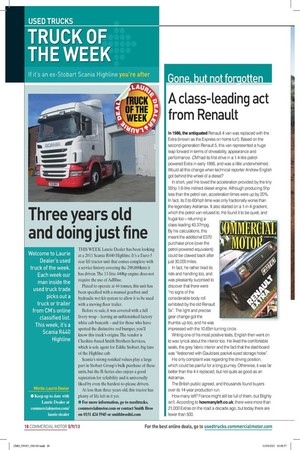A class-leading act from Renault
Page 13

If you've noticed an error in this article please click here to report it so we can fix it.
In 1986, the antiquated Renault 4 van was replaced with the Extra (known as the Express on home turf). Based on the second-generation Renault 5, this van represented a huge leap forward in terms of driveability, appearance and performance. CM had its first drive in a 1.4-litre petrolpowered Extra in early 1986, and was a little underwhelmed. Would all this change when technical reporter Andrew English got behind the wheel of a diesel? In short, yes! He loved the acceleration provided by the tiny 55hp 1.6-litre indirect diesel engine. Although producing Shp less than the petrol van, acceleration times were up by 20%. In fact, its to 60mph time was only fractionally worse than the legendary Astramax. It also started on a 1-in-4 gradient, which the petrol van refused to. He found it to be quiet, and
frugal too — returning a class-leading 43.37mpg. By his calculations, this meant the additional £370 purchase price (over the petrol-powered equivalent) could be clawed back after just 30,000 miles. In fact, he rather liked its ride and handling too, and was pleasantly surprised to discover that there were "no signs of the considerable body roll exhibited by the old Renault 5s". The light and precise gear change got the thumbs up too, and he was
impressed with the 10.65m turning circle.
Writing one of his most positive tests, English then went on to wax lyrical about the interior too. He liked the comfortable seats, the grey fabric interior and the fact that the dashboard was "festooned with Gauloises packet-sized storage holes".
His only complaint was regarding the driving position, which could be painful for a long journey. Otherwise, it was far better than the 4 it replaced, but not quite as good as an Astramax.
The British public agreed, and thousands found buyers over its 14-year production run.
How many left? France might still be full of them, but Blighty isn't. According to howmanyleft.co.uk, there were more than 21,000 Extras on the road a decade ago, but today there are fewer than 500.









































